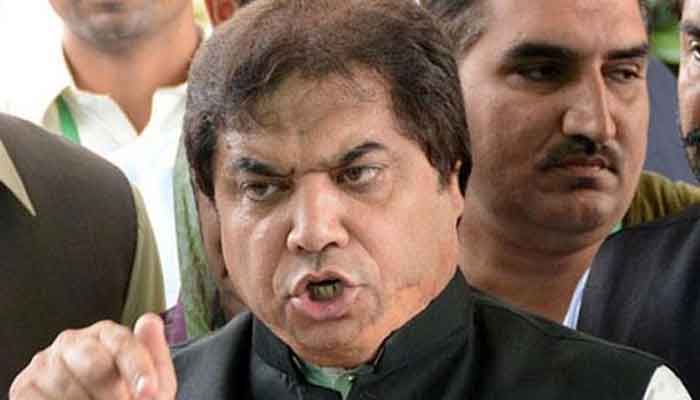LHC suspends Hanif Abbasi’s sentence, orders his release
A special court for the Control of Narcotics Substance (CNS) had awarded life imprisonment along with one million rupees fine to Abbasi on July 21, 2018 in the ephedrine case, registered by the Anti-Narcotics Force (ANF) in 2012.
LAHORE: The Lahore High Court (LHC) on Thursday suspended the life sentence handed to Pakistan Muslim League-Nawaz (PML-N) leader Hanif Abbasi in the 2018 ephedrine quota case and ordered for his release on bail.
A two-member bench, headed by Justice Alia Neelum, after hearing detailed arguments from both sides, accepted Abbasi’s plea to suspend the sentence.
A special court for the Control of Narcotics Substance (CNS) had awarded life imprisonment along with one million rupees fine to Abbasi on July 21, 2018 in the ephedrine case, registered by the Anti-Narcotics Force (ANF) in 2012.
“The trial court, while handing down the sentence, did not consider the settled law and facts of the case. Keeping in view the legal defects in the case, the life term awarded to appellant (Abbasi) is hereby suspended and he be released on bail,” the LHC order explained.
Abbasi was contesting election against his main rival, Awami Muslim League chief Sheikh Rashid Ahmad, now Federal Minister for Railways, from NA-60, Rawalpindi, but he stood disqualified following the verdict four days before the July-25 general election. The trial judge had announced the conviction around midnight to meet a deadline set by a single judge of the Lahore High Court’s Rawalpindi bench. The LHC, in a directive on June 11, 2018, had ordered the trial court to announce its verdict by July 21.
The appellant’s lawyer contended that Abbasi was suffering from four different diseases, adding that he also suffered a cardiac arrest inside the jail. He argued that seven other persons named in the case had been freed by the trial court while his client was awarded life term. The lawyer pleaded with the high court to suspend his client’s sentence and order his release on bail.
The counsel said the conviction of the appellant was politically motivated as only one out of eight suspects of the case was convicted and that was his client. He said the appellant never misused the ephedrine quota, but the trial court ignored the basic legal questions before handing down the impinged sentence. He argued that the trial court admitted 75 per cent part of Abbasi’s defence statement under Section 342 CrPC while rejected the remaining, which was a violation of the settled law. He argued that the ephedrine did not fall within the definition of scheduled drug or controlled narcotics. However, the counsel said the trial judge relied on a definition of ephedrine explored through Google search engine.
After the conviction, Abbasi was initially kept in the Adiala jail Rawalpindi and was shifted to Attock Jail after his photograph with former prime minister Nawaz Sharif in the room of a jail official surfaced. Later, he was shifted to camp jail, Lahore.
The ephedrine case surfaced in March 2011 when the then federal minister Makhdoom Shahabuddin told the National Assembly that the government would investigate the alleged allocation of a quota for production of 9,000-kg of ephedrine to two pharmaceutical companies — Berlex Lab International and Danas Pharmaceutical Limited. The Anti-Narcotics Force (ANF) had eventually registered a case in June 2012 against nine suspects, including Abbasi.
He was found guilty of selling 500-kg of ephedrine to narcotics smugglers. He had obtained the controlled chemical for his company, Gray Pharmaceutical, in 2010. However, instead of using it for medicinal purposes, Abbasi allegedly sold it to narcotics smugglers.
-
 Why Prince William Releases Statement On Epstein Scandal Amid Most 'challenging' Diplomatic Trip?
Why Prince William Releases Statement On Epstein Scandal Amid Most 'challenging' Diplomatic Trip? -
 Historic Mental Health Facility Closes Its Doors
Historic Mental Health Facility Closes Its Doors -
 Top 5 Easy Hair Fall Remedies For The Winter
Top 5 Easy Hair Fall Remedies For The Winter -
 Japan Elections: Stock Surges Record High As PM Sanae Takaichi Secures Historic Victory
Japan Elections: Stock Surges Record High As PM Sanae Takaichi Secures Historic Victory -
 Prince William, Kate Middleton Finally Address Epstein Scandal For First Time: 'Deeply Concerned'
Prince William, Kate Middleton Finally Address Epstein Scandal For First Time: 'Deeply Concerned' -
 Kim Kardashian Promised THIS To Lewis Hamilton At The 2026 Super Bowl?
Kim Kardashian Promised THIS To Lewis Hamilton At The 2026 Super Bowl? -
 Andrew Mountbatten-Windsor Throws King Charles A Diplomatic Crisis
Andrew Mountbatten-Windsor Throws King Charles A Diplomatic Crisis -
 Barack Obama Hails Seahawks Super Bowl Win, Calls Defense ‘special’
Barack Obama Hails Seahawks Super Bowl Win, Calls Defense ‘special’ -
 Pregnant Women With Depression Likely To Have Kids With Autism
Pregnant Women With Depression Likely To Have Kids With Autism -
 $44B Sent By Mistake: South Korea Demands Tougher Crypto Regulations
$44B Sent By Mistake: South Korea Demands Tougher Crypto Regulations -
 Lady Gaga Makes Surprising Cameo During Bad Bunny's Super Bowl Performance
Lady Gaga Makes Surprising Cameo During Bad Bunny's Super Bowl Performance -
 Paul Brothers Clash Over Bad Bunny's Super Bowl Performance
Paul Brothers Clash Over Bad Bunny's Super Bowl Performance -
 South Korea: Two Killed As Military Helicopter Crashes During Training
South Korea: Two Killed As Military Helicopter Crashes During Training -
 Elon Musk Unveils SpaceX’s Moon-first Strategy With ‘self Growing Lunar City’
Elon Musk Unveils SpaceX’s Moon-first Strategy With ‘self Growing Lunar City’ -
 Donald Trump Slams Bad Bunny's Super Bowl Performance: 'Absolutely Terrible'
Donald Trump Slams Bad Bunny's Super Bowl Performance: 'Absolutely Terrible' -
 Jake Paul Criticizes Bad Bunny's Super Bowl LX Halftime Show: 'Fake American'
Jake Paul Criticizes Bad Bunny's Super Bowl LX Halftime Show: 'Fake American'




